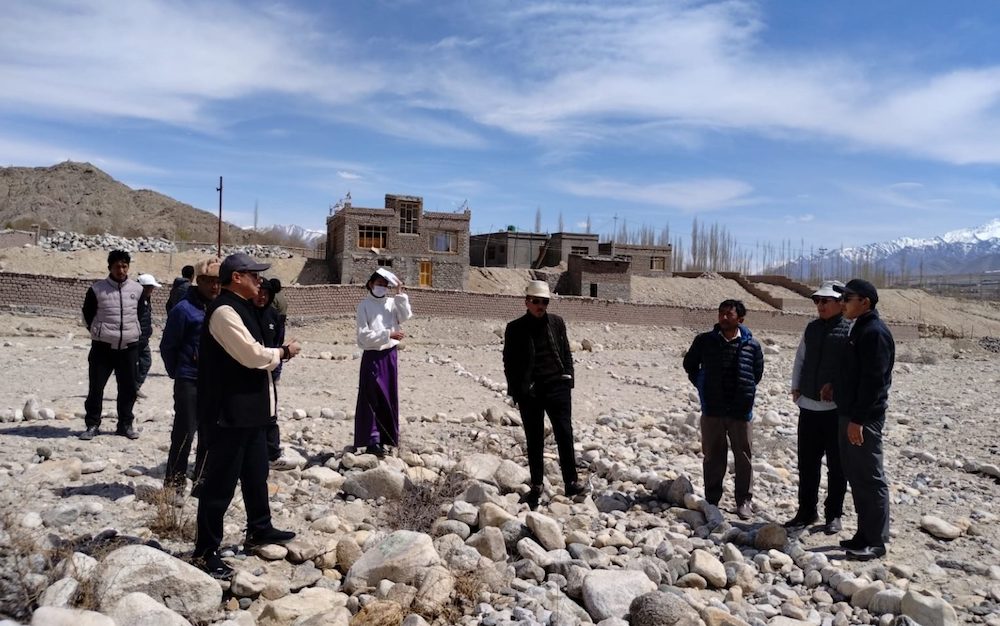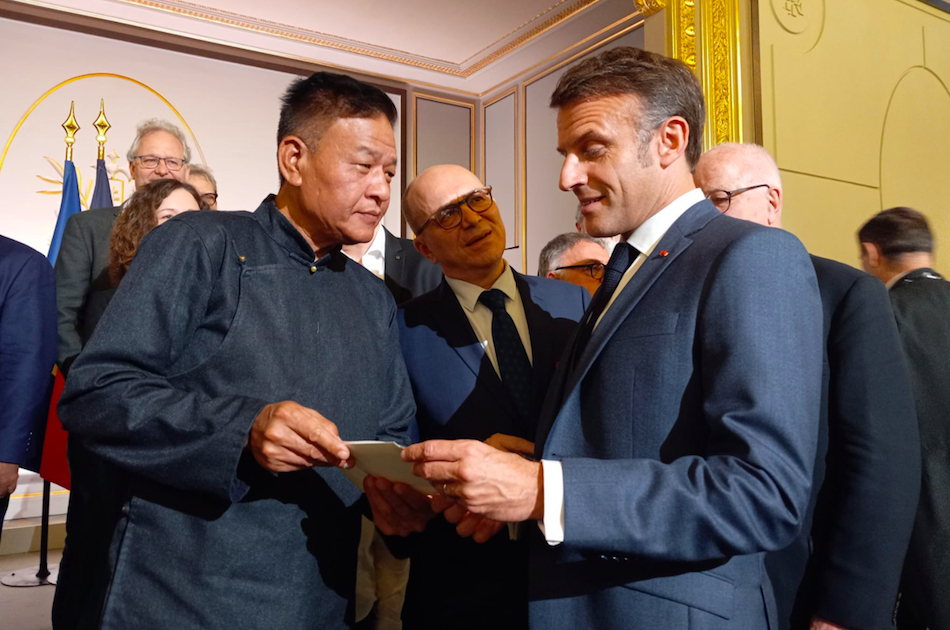By Lobsang Wangyal
 Mcleod Ganj — Nawang Khechog has travelled from that of a hermit meditator to being a Grammy nominee and one of the most celebrated and foremost Tibetan musicians around the world. After a deadly accident in February this year, Khechog speaks about his life’s journey to this reporter.
Mcleod Ganj — Nawang Khechog has travelled from that of a hermit meditator to being a Grammy nominee and one of the most celebrated and foremost Tibetan musicians around the world. After a deadly accident in February this year, Khechog speaks about his life’s journey to this reporter.
The accident
The Civil Forum of Nepal invited Nawang Khechog to receive the country’s highest civilian honour in February this year. It was the first time that a Tibetan had been honoured with this award by Nepal. After taking part in a concert there, enroute to the Orissa Tibetan settlement where he was going to celebrate Losar, the Tibetan New Year, with his father and relatives, tragedy struck.
The taxi in which Khechog was travelling with his son, Sangye, and niece, Pema Choedon, collided head-on with a Tata truck. Pema Choedon died on the spot due to brain damage.
Khechog was unconscious. Sangye was miraculously unhurt except for a small injury on his forehead, and he was anxious to find out how could he deal with the situation.
Sangye was born and brought up in Australia by Khechog’s former wife, Leslie. Suddenly he was handling the difficulties of India. “He was amazing”, said Nawang. He brought me to Bhubaneswar. He was basically doing all the things that he could think of, and saved my life.”
After trying three different hospitals, Kalinga Hospital referred Khechog to the Max hospital in Delhi to treat his brain damage. To go there was costing a fortune — 700,000 rupees. This amount was to pay a chartered flight, doctors and medical equipment. “My ex-wife, Leslie, who knew Richard Gere called him up and asked his help. Mr Gere kindly agreed to help and paid the entire amount. I was in Max hospital for two weeks.”
Doctors at the Max, after all the treatment they could give, told Khechog that time and nature was the best healer.
Tong-len meditation
Despite the pain with many broken bones and open wounds, the hospital in Bhubaneshwar did not give him any pain killer. Tong-len (a high form of meditation) became Khechog’s panacea. “My wife, Tsering Youdon, and son saw me getting free of pain after I meditated on Tong-len.”
Tong-len meditation is visualisation of taking sufferings of all the sentient beings upon yourself with your own suffering, and sending all your joys and merits out to relieve their sufferings. “This meditation helped me a lot. My wife and son saw the changes taking in me when I did Tong-len. So, Tong-len became my spiritual pain-killer.” Laughs.
Pema Choedon
“I am very sad that my niece Pema Chodon passed away.” Khechog did not know of her death until a day before he had an audience with the Dalai Lama in Delhi.
“I know my niece, Pema Choedon, was a strong and determined woman. She is also ambitious and wanted to achieve many things in her life. She wanted to conquer Mt Everest.”
Pema Choedon wanted to be a Miss Tibet as well. But due to her army background she had to withdraw from the competition.
“I feel that Pema Choedon was lucky in one way. We were able to offer puja for her soul when many of the high lamas had congregated in Dharamshala. She may have a wonderful rebirth.”
During the audience with the Dalai Lama, Khechog brought a photo of Choedon and the Dalai Lama offered his prayers for her!
Meeting the Dalai Lama
The news of his accident had reached the Dalai Lama, who called Khechog for a meeting when he was in Delhi in April.
“The first thing His Holiness asked me was if I could play flute.”
It happened that the first thing Khechog did after the accident was play flute. “I went in the bathroom and recorded a flute composition expressing how I felt about the accident, specially the Tong-len practice.”
Musical journey
From being a monk and a hermit, Khechog’s karma tilted him to go in a different way. He disrobed after four years of meditation in the Himalayan mountains. Flute was meant-to-be for him. From being a hobby, playing flute shot up to become his life.
After he became a layperson, he went to Australia, where he lived for five years. There his music just went on – rolling off as a snowball. “I never expected to produce an album and be successful in music.”
Despite his hectic musical career, spiritual practice is still a very important part of his life. Samsara and the existence of suffering are realities for him. Buddha’s path to wisdom and compassion, to eliminate suffering and transform ones mind, is the highest inspiration for his music and life.
The accident became a part of his spiritual practice. “It gave me a huge lesson and helped me keep my spiritual practice in track. I actually saw the impermanent nature of our life.”
Music has given him an important platform. He uses this platform to educate people about the suffering of the Tibetan people under the Chinese government. He talks about the destruction and exploitation of Tibet’s environment, its beautiful culture, which has the potential to contribute for world peace.
“If the current situation in Tibet is not stopped, Tibet is going to be completely lost.”
Music was Khechog’s karma to serve his country.
His first big break was when he was invited by Tibet House New York to play in a concert in 1991. He then toured extensively in the US and Canada.
He uses the platform to promote what he learned during his training as a monk and a hermit — love and compassion. He has now developed a workshop called ‘Awakening Kindness’.
Then comes the Grammy story. He became the first Tibetan to be nominated for a Grammy award. “I am fortunate that I have been nominated for a Grammy. There are two sides for that. On one hand, I may become egotistical, which could be destructive. On the other hand, it is useful. You get noticed and people pay more attention. So, there are more concert requests. People also listen to you more carefully.”
The most moving concert for him was when he was given the chance to open the UN Earth Summit in 1992. “I couldn’t believe that I was going to open and play in the UN general assembly hall.”
“It was unbelievable ? a Tibetan refugee boy born and brought up in Orissa Tibetan settlement getting such an opportunity.”
The night before the performance was a tough one for him. On the one hand he had such a great chance to speak about Tibet in front of the representatives from around the world. On the other hand there was the Trust put on him by the organisers.
He didn’t betray the organisers and didn’t frustrate himself. He played the Tibetan national anthem with his flute in front of the Chinese desk while the dignitaries were taking their seats. “So, I made a symbolic gesture, expressing my feelings for Tibet and didn’t hurt the organisers.”
Besides wind instruments, Khechog does overtone chanting to produce his music, which is quiet and meditative.
“People are surprised when they hear the overtone chanting. They appreciate this unique talent of Tibet.”
Khechog is not a traditional or folk musician although he plays in all kinds of concerts, even in rock concerts. He describes himself as a contemporary Tibetan artiste. “What I create is a new form of music. It is contemporary Tibetan spiritual music.”
Yadong and Riga (Tibet) and Chukie Tethong (India) are among his top rated Tibetan artistes. Tsering Gyurmey (Nepal), Techung (US) and Amchok Gonpo Dhondup (Canada) are among his highly regarded Tibetan musicians and singers of today’s times.
Living a life as a musician for 21 years, he feels that being genuine, playing from ones heart, and trying to motivate others give power in music.
“If there is power and feeling in music, it affects the musician as well as the listeners.”
“I try to produce such music. To try that, I meditate before concerts.”
As a true son of music, he plays for the joy, beauty and power of music. “Playing for name, fame and money will not carry a musician on for long time.”
He has about a dozen albums to his credit, the last one being the “Tibetan Meditation Music”.
One of the pieces in this album was composed in China when he was visiting Wu tai shan for pilgrimage.
Korean connection
He has performed in many countries in the world. Korea has been a country where he has performed most, in different monasteries, and also in many concerts with Korean artistes.
“I have a very deep karma with Korea.”
A Korean documentary team is now putting together a film about him. They will follow him for a few months in the US, Europe and South Korea. The film will be distributed in 24 countries.
Tibetan situation
Tibet will be free. He doesn’t doubt it. “I strongly believe that a day will come when there will be a settlement of the Tibetan situation with China. My position is with the Middle Way policy.”
“I follow His Holiness guidance because his is the wisest and most reasonable one.”
“China is a giant power. We have to be smart and skilful. And we must keep our struggle through non-violent means and try to dialogue and use other peaceful methods.”
Once the Tibetan situation is settled, he would like to devote his time more on spiritual practice and do less concerts.
Last words
As a true son of Tibet, Tibet and the welfare of the fellow Tibetans are constantly on Khechog’s mind. His last words were also on these issues.
“Whether we follow the Middle Way policy (for autonomy for Tibet) or struggle for an independent Tibet, or whatever else Tibetans follow for our freedom struggle, we must not hate each other but must remain united.”
“We need the strength of each and every Tibetan because our opposition is too powerful.”









